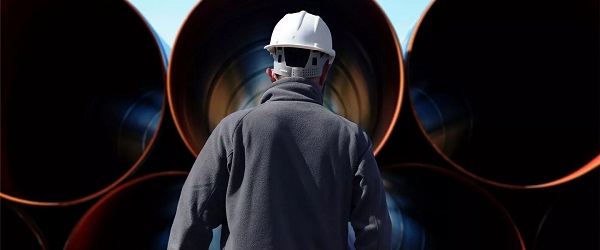Economy
Next federal government should discard harmful energy policies—tariffs notwithstanding

From the Fraser Institute
By Julio Mejía and Elmira Aliakbari
Over the last decade, the Trudeau government missed countless opportunities to reduce Canada’s heavy reliance on the United States and instead introduced regulatory hurdles that hindered our energy sector and limited access to new markets
While the full extent of the damage from President Trump’s trade war remains unknowns, Canadians should understand that, with a federal election looming, shortsighted policies here at home have left Canada in a vulnerable position.
Oil and gas are Canada’s main exports and the U.S. is their primary destination. In 2023, nearly 97 per cent of Canada’s oil exports went to our southern neighbour, and the U.S. is our sole foreign market for our natural gas. This concentration of exports to a single destination has given the U.S. significant leverage. For example, Canada exports natural gas at discounted prices—up to 60 per cent lower than what American producers receive in U.S. markets. Similarly, our oil has been sold for less than what U.S. producers receive, with price differences exceeding 40 per cent in recent years. Selling our energy at discounted prices to the U.S. has cost Canadians tens of billions of dollars in lost revenues.
And yet, over the last decade, the Trudeau government missed countless opportunities to reduce Canada’s heavy reliance on the United States and instead introduced regulatory hurdles that hindered our energy sector and limited access to new markets. To unleash Canada’s oil and gas sector, the next government must reverse a whole set of harmful energy policies.
For example, the Northern Gateway pipeline designed to transport crude oil from Alberta to British Columbia’s coast. In 2016, one year after taking office, the Trudeau government cancelled this previously approved $7.9 billion project, which would have greatly expanded Canada’s access to Asian markets.
Then there’s the Energy East and Eastern Mainline pipelines from Alberta and Saskatchewan to the east coast. The Trudeau government effectively made the project economically unfeasible by introducing new regulatory hurdles, ultimately forcing the TransCanada energy company to withdraw from the project, which would have expanded access to European markets.
The record is equally bleak for liquified natural gas (LNG) export facilities, which could open access to overseas markets. Regulatory barriers and long approval timelines under the Trudeau government significantly hindered the development of the Énergie Saguenay LNG project in Quebec, the Repsol LNG plant in New Brunswick and the Pacific NorthWest LNG facility in B.C.
And when opportunity knocked to diversify our trading partners, the government failed to seize it. Following the Russian invasion of Ukraine, political leaders from Latvia, Ukraine, Germany, Greece and Poland turned to Canada seeking new LNG supply, but Trudeau insisted there was “no business case for LNG” and missed the chance to open new markets.
Finally, the Trudeau government’s Bill C-69 created massive uncertainty in project reviews and approvals by introducing vague assessment criteria including “gender implications” for major energy projects including pipelines and LNG export facilities. In fact, according to a recent report, which analyzed 25 major projects that entered the federal government’s review process between 2019 and 2023, almost every project submission remained stuck in the early stages (phase 1 or 2) of the four-phase process, underscoring the inefficiency of the review process.
Meanwhile, the Trudeau government’s Bill C-48 restricts Canadian exports to Asia by banning large oil tankers from B.C.’s northern coast. And its targeted emissions cap, which requires only the oil and gas sector to cut greenhouse gases by 35 per cent below 2019 levels by 2030, is designed to curtail energy production, further limiting Canada’s ability to meet global energy demands.
During the upcoming election campaign, Canadians should demand to hear how (or if) each party will remove barriers that hinder the development of energy projects and streamline approvals to unlock Canada’s untapped potential. Tariffs or not, Canada can’t afford to keep undermining its key export sector with regulatory barriers.
Business
Emission regulations harm Canadians in exchange for no environmental benefit

From the Fraser Institute
By Julio Mejía and Elmira Aliakbari
The PBO estimates that the CFR will decrease Canada’s economic output by up to 0.3 per cent—or approximately $9.0 billion—in 2030. For context, that’s more than the entire output of Prince Edward Island in 2024, so the effects are roughly equivalent to wiping out the economy of a whole province.
The Carney government recently announced changes to the Clean Fuel Regulations (CFR), signalling stricter carbon content rules for gasoline and diesel—though few details were provided. While the prime minister expressed confidence that the changes will strengthen the Canadian economy, in reality, the CFR is designed to increase fuel prices in exchange for negligible environmental benefits. If the government is serious about prioritizing the wellbeing of Canadians, it shouldn’t tinker with the CFR—it should eliminate it.
The CFR, which came into effect in July 2023, aims to reduce greenhouse gas (GHG) emissions by requiring a gradual reduction in the carbon content of gasoline and diesel. By 2030, fuels must contain 15 per cent fewer GHG per unit of energy than in 2016. Those who don’t meet the target must buy compliance credits, which raises their costs. Ultimately, these costs are all passed on to Canadians at the pump.
According to a recent study by the Parliamentary Budget Officer (PBO), the CFR is expected to increase fuel prices by up to 17 cents per litre for gasoline and 16 cents for diesel by 2030. These costs will be added on top of already high, policy-driven fuel costs. In 2023, for example, the average price of gasoline in Canada was 157.3 Canadian cents per litre, compared to just 129.4 cents per litre in the United States—a 21 per cent difference, mainly the result of fuel taxes in Canada.
As fuel prices rise due to the CFR, the costs of running tractors, powering machinery, and producing and transporting goods and services will all increase, setting off ripple effects across our economy. The PBO estimates that the CFR will decrease Canada’s economic output by up to 0.3 per cent—or approximately $9.0 billion—in 2030. For context, that’s more than the entire output of Prince Edward Island in 2024, so the effects are roughly equivalent to wiping out the economy of a whole province.
Of course, increases in fuel prices also mean more pressure to household budgets. The PBO estimates that in 2030, the average Canadian household will incur $573 in additional costs because of the changes to the CFR, and lower-income households will bear a disproportionately larger burden because they spend more of their budget on energy.
The policy’s uneven impact across provinces is particularly significant for lower-income regions. For example, households in Nova Scotia and P.E.I.—two of the provinces with the lowest median household incomes—are expected to bear average annual costs of $635 and $569, respectively. In contrast, families in Ontario and British Columbia—two of the provinces with higher median household incomes—will pay less, $495 and $384 per year, respectively. Simply put, the CFR imposes more costs on those who make less.
To make matters worse, the expected environmental benefits of the CFR are negligible. Even if it delivers its full projected reduction of 26 million tonnes of GHG emissions by 2030, that represents only “two weeks of greenhouse gas emissions from the Canadian economy,” according to the federal government.
Given that GHG emissions cross all borders regardless of where they originate, in a broader perspective, that reduction represents just 0.04 per cent of projected global emissions by 2030. So, Canadians are being asked to pay a material price for a measure that will have virtually no environmental impact.
Toughening regulations on carbon content for gas and diesel won’t benefit Canadians, in fact, it will do the opposite. The CFR places a real financial burden on Canadian households while delivering no meaningful environmental benefit. When a policy’s costs vastly outweigh its benefits, the answer isn’t to adjust it, it’s to scrap it.

Julio Mejía
Business
Trump Blocks UN’s Back Door Carbon Tax


From the Daily Caller News Foundation
Has the time come for America to seriously reassess its participation in and support for the United Nations (U.N.)?
It’s a question that some prominent people are asking this week after the increasingly woke and essentially useless globalist body attempted to sneak a global carbon tax in through the back door while no one was looking.
Except someone was looking, as it turns out. Republican Utah Sen. Mike Lee, who chairs the powerful Senate Energy and Natural Resources Committee and is part of the majority on both the Senate Judiciary and Senate Foreign Relations Committees, said in an X post Thursday evening that this latest bit of anti-American action “warrants our withdrawal from the UN.”
Dear Readers:
As a nonprofit, we are dependent on the generosity of our readers.
Please consider making a small donation of any amount here.
Thank you!
Secretary of State Marco Rubio said in his own X post on the matter on Wednesday that the Trump administration “will not allow the UN to tax American citizens and companies. Under the leadership of POTUS (President Donald Trump), the U.S. will be a hard NO. We call on other nations to stand alongside the United States in defense of our citizens and sovereignty.”
On Friday afternoon, Mr. Rubio took to X again to announce the news that efforts by himself and others in the Trump administration succeeded in killing an effort to move the tax forward during a meeting in London. However, the proposal is not fully dead – a final vote on it was simply delayed for a year.
The issue at hand stems from an attempt by the International Maritime Organization (IMO) – an agency of the U.N. – to impose net-zero rules on fuels used for seaborne shipping operations. The Trump administration estimates the imposition of the new requirements will increase the cost of shipping goods by about 10%, thus creating yet another round of inflation hitting the poorest citizens the hardest thanks to the globalist obsession with the amount of plant food – carbon dioxide – in the atmosphere.
Known as the IMO Net-Zero Framework, the proposal claims it would effectively “zero out” emissions from the shipping industry by 2050.
The potential implications if the U.N. ultimately succeeds in implementing its own global carbon tax are obvious. If this unelected, unaccountable globalist body can levy a carbon tax on Americans, a concept that America’s own elected officials have steadfastly rejected across the terms of the last five U.S. presidents, what would then prevent it from imposing other kinds of taxes on the world to support its ideological goals?
President Trump’s opposition to exactly this kind of international intrusion into America’s domestic policy choices is the reason why he has twice won the presidency, each time de-committing the U.S. from the Paris Climate Accords.
It has become increasingly obvious in recent years that the central goal of the global climate alarm movement is to dramatically raise the cost of all kinds of energy in order to force the masses to live smaller, more restricted lives and make their behavior easier for authoritarian governments to control. This camel’s nose under the tent move by the U.N. to sneak a global carbon tax into reality is just the latest in a long parade of examples that serve as proof points for that thesis.
At some point, U.S. officials must seriously reassess the value proposition in continuing to spend billions of dollars each year supporting and hosting a globalist organization whose every action seems designed to inflict damage on our country and its people. Now would be a good time to do that, in fact.
David Blackmon is an energy writer and consultant based in Texas. He spent 40 years in the oil and gas business, where he specialized in public policy and communications.
-

 Business17 hours ago
Business17 hours agoQuebecers want feds to focus on illegal gun smuggling not gun confiscation
-

 Uncategorized2 days ago
Uncategorized2 days agoNew report warns WHO health rules erode Canada’s democracy and Charter rights
-

 Business18 hours ago
Business18 hours agoEmission regulations harm Canadians in exchange for no environmental benefit
-

 Courageous Discourse16 hours ago
Courageous Discourse16 hours agoNo Exit Wound – EITHER there was a very public “miracle” OR Charlie Kirk’s murder is not as it appears
-

 Energy2 days ago
Energy2 days agoMinus Forty and the Myth of Easy Energy
-

 Crime1 day ago
Crime1 day agoFrance stunned after thieves loot Louvre of Napoleon’s crown jewels
-

 Business2 days ago
Business2 days agoUS government buys stakes in two Canadian mining companies
-

 Fraser Institute2 days ago
Fraser Institute2 days agoMétis will now get piece of ever-expanding payout pie









